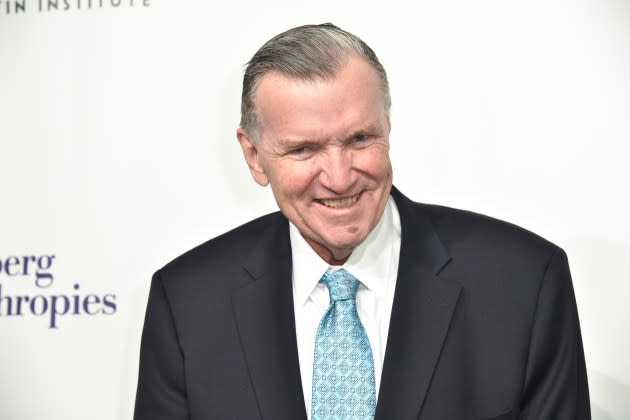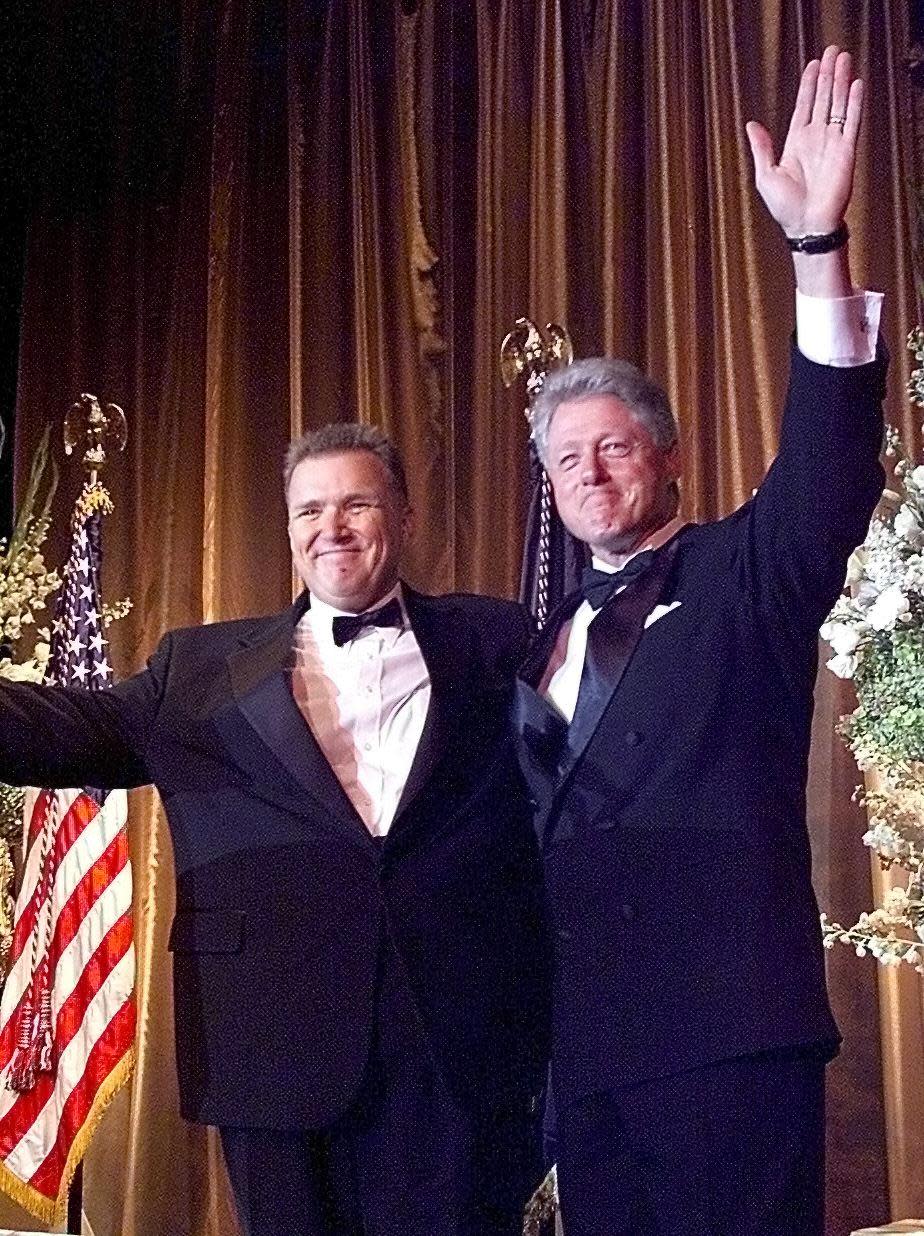David Mixner Dies: LGBTQ Activist Who Pressed And Persuaded Ronald Reagan & Bill Clinton On Civil Rights Was 77

UPDATED, with Clinton statement and details on arrangements: David Mixner, the activist and political strategist who lobbied — and protested — political figures in the movement for LGBTQ equality, died on Monday. He was 77.
Mixner suffered from complications from long Covid, a friend, Steven Guy, told The New York Times.
More from Deadline
Hollywood & Media Deaths In 2024: Photo Gallery & Obituaries
Alexei Navalny Dies: Russian Opposition Leader & Subject Of Oscar-Winning Doc Was 47 — Reports
Mixner also was a playwright, having recounted his decades of activism in a series of plays including Oh Hell No!, which he performed in New York, Los Angeles and other cities in 2014, 2015 and 2016, and later 1969 and Who Fell Into the Outhouse? The stagings, benefitting major LGBTQ organizations, featured Mixner recalling his early years of rural poverty, his involvement in protests of the Vietnam war, his experiences coming out, living through the AIDS crisis and his support and break with longtime friend Bill Clinton when the then-president failed to end a prohibition on gays and lesbians in the military.
White House Press Secretary Karine Jean-Pierre said that Mixner was “a trailblazer in the fight for LGBTQ+ rights. His moral clarity never wavered, which is why be became such an invaluable confidant for many, including presidential hopefuls, elected leaders and voices of the movement for LGBTQ+ equality. Perhaps most importantly, he was deeply dedicated to mentoring the next generation of LGBTQ+ leaders fighting to create a better world.”
Clinton said in a statement, “In the more than 50 years since I met David Mixner, I’ve known few people more committed to social justice and so true to their principles. America is a better, fairer, more inclusive place because of his long fight for LGBTQ+ rights and so much more. His legacy endures in the change he made and the generations of leaders he mentored and inspired. I will miss him.”
Mixner had been attending the University of Maryland when he dropped out and began working for the presidential campaign of Eugene McCarthy, the Minnesota senator seeking the presidency in 1968 on an anti-war platform. He attended the Democratic Convention that year, when, in the ensuing police riot, he was beaten as authorities went after demonstrators with their nightsticks. “I remember going into a fetal position and feeling the blows of the billy club on my legs,” Mixner wrote in his 1996 memoir, Stranger Among Friends. He was on and off crutches for the next several years, he wrote.
He served as an organizer for the Moratorium to End the War in Vietnam, where he met Clinton during a retreat. Mixner wrote that they were connected “not only for our ambitions for the future but by the similarities of our pasts.”
Mixner continued to pursue political organizing, moving to Los Angeles in the 1970s when he worked on the campaign of Harvey Milk, who was the first openly gay person elected to San Francisco’s Board of Supervisors. In Los Angeles, he was one of the founders of the Municipal Elections Committee of Los Angeles, the first gay political action committee in the country, as he managed the re-election campaign of then-Mayor Tom Bradley.
In his memoir, Mixner recounted the level of anxiety and depression he went through during this period as he came out to friends, business associates and eventually family.
In 1978, as the growing gay rights movement was met with a conservative backlash, Mixner and his life and business partner, Peter Scott, joined with friends to launch a campaign against a proposed California ballot initiative that would have barred gays and lesbians from teaching positions. Known as the Briggs Initiative, the measure initially had overwhelming support. But he and Scott secured a meeting with Ronald Reagan, by then the former governor of California who was considering a run for the presidency.
In an interview with Variety in 2016, Mixner called Reagan “one of the most gracious men in politics I have ever met.”
“Right up front he said, ‘Look, I am probably going to endorse this initiative,’” he recalled. “And then we had a long conversation and he was open to change. And then he listened to our case and he changed his mind.”
Reagan’s public opposition made a huge difference. Public opinion shifted, and the measure was defeated.
During the next decade, AIDS claimed the lives of many of Mixner’s friends and fellow activists, including Scott, who died in 1989. Mixner later decried the “mean and brutal inaction” of the Reagan administration, which he attributed to the religious right.
At the time politicians still viewed publicly aligning with the gay and lesbian movement as something to downplay or even avoid. When Michael Dukakis was the Democratic nominee in 1988, Mixner, after meeting with a group of prominent gay donors, including in entertainment, contacted the campaign with an offer to raise $1 million. The Dukakis fund-raiser, though, turned it down. “Too risky,” the campaign official told him, according to Mixner’s memoir.

Four years later, though, Clinton tapped Mixner to help raise money for his presidential campaign, embracing the gay and lesbian community in a way that previous candidates had not. Mixner and other activists and fundraisers wanted to be sure that the money raised would be “clearly designated as GAY MONEY,” journalist Karen Ocamb wrote in the Los Angeles Blade. In a February, 1992, meeting with the group Access Now for Gay and Lesbian Equality, Mixner “whispered in Clinton’s ear like a political strategist, treated him like a friend, and served as an LGBTQ ambassador for all our hopes and dreams to the man who would become the next President,” Ocamb wrote.
“Thanks to David Mixner, Bill Clinton saw us as ‘a people,’ not just a culture war issue,” Ocamb wrote.
In 1992, Clinton headlined an LGBTQ fundraiser for his campaign at the Hollywood Palace Theater, telling those gathered, “I have a vision, and you are part of it.”
In his speech, Clinton had indicated that he would lift the ban on gays and lesbians in the military, telling the crowd that if a man or woman wanted to serve their country, “they ought to be able to do it.”
But Clinton was quickly met with opposition to lifting the ban. That led, later in 1993, to the new “don’t ask, don’t tell” policy, which essentially allowed LGBT members to serve as long as they kept quiet about their sexuality.
Mixner went public with his opposition, and even was arrested during a protest outside of the White House.
For a time, his break with Clinton got him frozen out of the White House.
“They made it impossible for me to work for four years,” Mixner told Variety. “I was banned from the White House, but interestingly enough, I didn’t get much support from the [LGBT] community. But that is OK, because I had to do what I thought was right.”
Mixner and Clinton eventually reconciled.
Mixner continued his activism into the 2000s, this time as don’t ask, don’t tell was still in place and as bans on same-sex marriage became a central feature of Republican-led campaigns. In California, voters passed Proposition 8, while new President Barack Obama still was hesitant about endorsing gay marriage. In 2009, Mixner called for a march and rally at the Capitol. The National Equality March featured speakers like Lady Gaga and the cast of Hair, and Mixner rallied the crowd of tens of thousands to continue to protest. He said, “I promise you on my life, that if you fill the jails, that if you work in those congressional districts, I will be able to stand before you and say, ‘My name is David Mixner. I am a gay man, and I am free.”
Funeral services for Mixner will be held at 10 a.m. on March 25 at Church of St. Paul the Apostle in New York. Contributions can be made to the David Mixner Memorial Fund to benefit the Ali Forney Center.
Best of Deadline
Hollywood & Media Deaths In 2024: Photo Gallery & Obituaries
2024 Awards Season Calendar - Dates For Writers Guild, Tonys & More
2024 Premiere Dates For New & Returning Series On Broadcast, Cable & Streaming
Sign up for Deadline's Newsletter. For the latest news, follow us on Facebook, Twitter, and Instagram.

 Yahoo News
Yahoo News 
